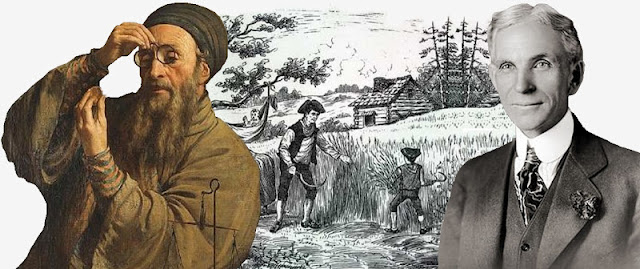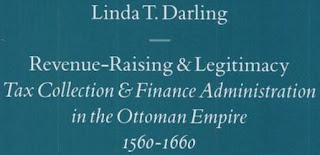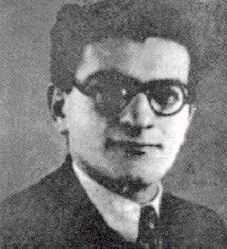[Note: As this article is reconstructed from a copy some
content/layout may vary from the original posting.]
Tax Farming, Talmudic Agriculture
Henry Ford once offered
in his editorial column, a $1000 reward to anyone who could
furnish him with an example of a Jewish farmer. Ford insisted
that Jews avoided
honest labour, favouring criminal activity in the financial industry.
Mr. Ford must of been
unfamiliar with Tax Farming, as
the Jews had been controlling that
form of agriculture, all around the globe, for hundreds and hundreds of
years.
Below is an explanation of Tax
Farming, followed by several examples of how Jews thrived in it.
As Israeli scholar Israel
Shahak alluded
to,
this was undoubtedly a
huge contributing factor to most of the
"pogroms," expulsions, and "blood libels" over
the centuries.
Tax Farming
Revenue farming means contracting out the
collection of state income, taxes or revenue from state-owned monopolies
and enterprises, to private bidders. It attempts to maximize revenue
through competitive bidding, in which bidders undertake to supply an
agreed-upon sum regardless of the actual yield of the revenue source. It
transfers risk and effort from the government to the tax farmer, who is
not only burdened with the labor of collection but is responsible (often
in advance) for the full sum contracted for, even if the revenue source
fails to yield it. On the other hand, if the revenue yield is higher
than the contracted amount, the tax farmer benefits from the
discrepancy, which in certain circumstances can be considerable. Tax
farming is a high-risk, high-yield investment. ... Revenue farming was
known to the ancient world and was widely employed in both east and west
down to the development of modern bureaucracy. Its use was on the rise
in early modern Europe as monarchs expanded their standing armies,
gained tighter control over their kingdoms, and sought to increase their
revenues. By contracting revenue collection to private persons,
ambitious rulers employing small numbers of officials could exploit wide
territories for their own benefit rather than delegating control to
others. In addition, granting tax farms became a means of bestowing
privilege and rewarding loyalty and service in a fashion that did not
deplete crown lands or royal treasure. Besides monetarizing and
potentially increasing the yield, tax farming also made delivery of
money to the treasury more predictable and more secure.
Darling, Linda T., Revenue-Raising and Legitimacy:
Tax Collection and Finance Administration in the Ottoman Empire,
1560-1660. E. J. Brill; Leiden, NL. 1996. p.119-121.
[full original article can be read through Google
Books if Googling the quote with
quotation marks:
"Revenue farming means contracting out the collection of state income,
taxes or revenue from state-owned monopolies and enterprises"]
Belgian Jew, Abraham Leon, real
name Wejnstok (1918 - 1944), Trotskyite, ex-Zionist, sent
to Auschwitz in June 1944, apparently he was killed there in
September 1944.
Written during WW2, Leon's book
The Jewish Question: A Marxist Interpretation was
posthumously published in 1946 in French, and then in English in
1950:
From the book (see link for
the sources, or lack of
them, he's quoted from):
The cortes of Portugal
complain of Jewish usury in 1361 as
becoming an increasingly unbearable yoke upon
the population.
(c.1650) In
total, 63 percent of the tax farming business in
Brazil was in Jewish hands."In the circles of
the Spanish nobility and rich patrician class the
Jews were hated because of their state functions,
where they showed themselves to be servile
instruments of royalty, as well as because of the
great tax and impost farming by which the Jewish
magnates unceasingly augmented their fortunes."
"In 1469 the cortes
protest against the admission of Jews to tax farming
and against the protection with which the kings
surround them. Ritual trials and massacres come
to the support of the pressures exerted by, the
nobility upon royalty."
Sometimes the Jews
also go over to the offensive. In
1376 the banker Jekl employs bands of mercenaries
against noble debtors who have refused to pay their
debts. His son engages
mercenaries with a view to launching an attack
against Nuremburg,
the council of this city having confiscated his
houses.
Leon, Abram. The Jewish Question: A Marxist Interpretation.
Originally published in French in 1946. First English edition: Ediciones
Pioneras, Mexico City 1950.
The Entire Ottoman
Empire
ooo

Having become an
important segment of Ottoman society, the
Jewish community occupied since the fifteenth
century a particularly influential position in tax
farming and in interregional and international trade.
...
Extensively applied in
the Ottoman Empire even at this early period, tax
farming was one of the most profitable economic
activities for those who had accumulated cash
capital. Short of steady and regular cash
resources to meet current needs, and lacking the
complex tax collection system of a modern state, the
Ottoman government generally depended on cash
advances from individuals who had accumulated
capital through commercial activities. The
registers of tax farming, the so-called mukata's
defterleri, from the second half of the fifteenth
century contain many names of Jewish "capitalists"
serving as tax farmers.
... We
find Jews undertaking all kinds of tax farms
everywhere in the empire, particularly in the big
cities and at important sea ports, but also in many
smaller towns in the Balkans and Anatolia. ...
Because of its crucial
importance for state finances, the tax farm of the
Istanbul customs house conferred on its holders a
great deal of influence in affairs of state. During
the fifteenth and sixteenth centuries, this position
was quite often held by Jews. ... By the second half
of the sixteenth century, Jewish bankers and tax
farmers had gained a predominant place in Ottoman
finances and long distance trade. ...
International trade,
tax farming, and banking operations were all
interconnected at this time.
Levy, Avigdor. Jews, Turks, Ottomans: A Shared History, Fifteenth
Through the Twentieth Century. Syracuse University Press. 2002.
p.8-11.
Brazil
ooo
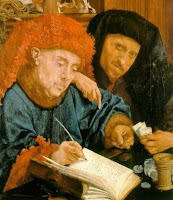
(c.1650) In total, 63
percent of the tax farming business in Brazil was in
Jewish hands.
Jacobs, Jaap. The Colony of New Netherland: A Dutch Settlement in
Seventeenth-Century America. Cornell University Press. 2009.
p.200.
Poland, Russia, Ukraine
ooo
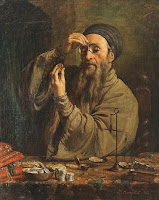
A source from the mid-seventeenth
century states: "Tax farming was
the cutomary occupation of most Jews in the kingdom
of Little Russia [the Ukraine] for they ruled in
every part of Little Russia." Travelers and
other observers in the seventeenth
and eighteenth centuries often
pointed out that all the innkeepers
in small urban settlements and villages were Jews.
... According to the partial 1764 census, tax
farming, leasing of estates, innkeeping, and the
sale of hard liquor in urban settlements ... in
the Polish kindom as a whole (including the Ukraine)
some 85—90 percent of the Jews were employed in
these occupations.
Weinryb, Bernard Dov. The Jews of Poland: A Social and Economic
History of the Jewish Community in Poland From 1100 to 1800. Jewish
Publication Society. 1976.
p.139.
------------------------------
"When a Jew, in America or in South Africa, talks to
his Jewish companions about 'our' government, he means the
government of Israel."
- David Ben-Gurion, Israeli Prime Minister

Viva Palestina!
Latest Additions
- in English
What is this Jewish
carnage
really about? - The background to
atrocities
Videos on Farrakhan, the Nation of Islam and Blacks and Jews

How Jewish Films and Television Promotes bias Against
Muslims
Judaism is Nobody's
Friend
Judaism is the Jews' strategy to
dominate non-Jews.
Jewish War Against
Lebanon!
Islam and Revolution
By Ahmed Rami
Hasbara -
The Jewish manual
for media deceptions
Celebrities bowing to their Jewish masters

Elie Wiesel - A Prominent False Witness
By Robert Faurisson
The Gaza atrocity 2008-2009

Iraq - war and occupation
Jewish War On
Syria!
CNN's Jewish version of "diversity"
- Lists the main Jewish agents
Hezbollah the Beautiful
Americans, where is your own Hezbollah?
Black Muslim leader Louis Farrakhan's Epic Speech in Madison Square
Garden, New York
 - A must see!
- A must see!
"War on Terror" -
on Israel's behalf!
World Jewish Congress: Billionaires, Oligarchs, Global Influencers for Israel
Interview with anti-Zionist veteran Ahmed Rami of Radio Islam
- On ISIS, "Neo-Nazis", Syria, Judaism, Islam, Russia...
Britain under Jewish
occupation!

Jewish World Power
West Europe
East Europe
Americas
Asia
Middle East
Africa
U.N.
E.U.
The Internet and
Israeli-Jewish infiltration/manipulations
Books
- Important collection of titles
The Judaization of
China
Israel: Jewish Supremacy in Action
- By David Duke
The Power of Jews in France
Jew Goldstone appointed by UN to investigate War Crimes in Gaza

The best book on Jewish Power
The Israel Lobby
- From the book
Jews and Crime - The archive
Sayanim - Israel's and Mossad's Jewish helpers abroad
Listen to Louis Farrakhan's Speech
- A must hear!
The Israeli Nuclear Threat
The "Six
Million" Myth
"Jewish History"
- a bookreview
Putin and the
Jews of Russia
Israel's attack on US warship USS Liberty
- Massacre in the Mediterranean
Jewish "Religion" - What is
it?
Medias
in the hands of racists
Strauss-Kahn - IMF chief and member of Israel lobby group

Stop Jewish Apartheid!
The Jews behind Islamophobia
Israel controls U.S. Presidents
Biden, Trump, Obama, Bush, Clinton...
The Victories of Revisionism
By Professor Robert Faurisson
The Jewish hand behind Internet
The Jews behind Google, Facebook, Wikipedia,
Yahoo!, MySpace, eBay...
"Jews, who want to be decent human beings, have to renounce being Jewish"
Jewish War Against Iran
Jewish Manipulation of World Leaders

Al Jazeera English under
Jewish infiltration

Garaudy's "The Founding
Myths
of Israeli Politics"
Jewish hate against Christians
By Prof. Israel Shahak
Introduction to Revisionist
Thought
- By Ernst Zündel
Karl Marx: The Jewish Question
Reel Bad Arabs
- Revealing the racist Jewish Hollywood propaganda
"Anti-Semitism" - What is it?
Videos
 - Important collection
- Important collection
The Jews Banished 47 Times in 1000 Years - Why?
Zionist
strategies
- Plotting invasions, formenting civil wars, interreligious strife,
stoking racial hatreds and race war
The International Jew
By Henry Ford
Pravda interviews Ahmed Rami

Shahak's
"Jewish History,
Jewish Religion"
The Jewish plan to destroy the Arab countries
- From the World Zionist Organization
Judaism and Zionism inseparable
Revealing photos of the Jews 
Horrors of ISIS Created by Zionist Supremacy
- By David Duke
Racist Jewish Fundamentalism
The Freedom Fighters:
 Hezbollah
- Lebanon
Hezbollah
- Lebanon
 Nation of Islam
- U.S.A.
Nation of Islam
- U.S.A.
Jewish Influence in America

- Government, Media, Finance...
"Jews" from
Khazaria stealing the land of Palestine
The U.S. cost of supporting Israel
Turkey, Ataturk and
the Jews

The truth about the Talmud
Israel and the Ongoing Holocaust in Congo
Jews DO control the media -
a Jew brags!
- Revealing Jewish article
Abbas - The Traitor
Protocols of Zion
- The whole book!

Encyclopedia of the
Palestine Problem
The
"Holocaust" - 120 Questions and Answers
Quotes
- On Jewish Power / Zionism
Caricatures / Cartoons

Activism!
- Join the Fight!


























